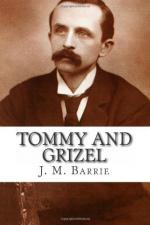“Can I help that?” growled Tommy. It was an agony to him even to speak about women.
“If you can’t,” said Pym, “all is over with you. An artist without sentiment is a painter without colours. Young man, I fear you are doomed.”
And Tommy believed him, and quaked. He had the most gallant struggles with himself. He even set his teeth and joined a dancing-class; though neither Pym nor Elspeth knew of it, and it never showed afterwards in his legs. In appearance he was now beginning to be the Sandys of the photographs: a little over the middle height and rather heavily built; nothing to make you uncomfortable until you saw his face. That solemn countenance never responded when he laughed, and stood coldly by when he was on fire; he might have winked for an eternity, and still the onlooker must have thought himself mistaken. In his boyhood the mask had descended scarce below his mouth, for there was a dimple in the chin to put you at ease; but now the short brown beard had come, and he was for ever hidden from the world.
He had the dandy’s tastes for superb neckties, velvet jackets, and he got the ties instead of dining; he panted for the jacket, knew all the shop-windows it was in, but for years denied himself, with a moan, so that he might buy pretty things for Elspeth. When eventually he got it, Pym’s friends ridiculed him. When he saw how ill his face matched it he ridiculed himself. Often when Tommy was feeling that now at last the ladies must come to heel, he saw his face suddenly in a mirror, and all the spirit went out of him. But still he clung to his velvet jacket.
I see him in it, stalking through the terrible dances, a heroic figure at last. He shuddered every time he found himself on one leg; he got sternly into everybody’s way; he was the butt of the little noodle of an instructor. All the social tortures he endured grimly, in the hope that at last the cork would come out. Then, though there were all kinds of girls in the class, merry, sentimental, practical, coquettish, prudes, there was no kind, he felt, whose heart he could not touch. In love-making, as in the favourite Thrums game of the dambrod, there are sixty-one openings, and he knew them all. Yet at the last dance, as at the first, the universal opinion of his partners (shop-girls, mostly, from the large millinery establishments, who had to fly like Cinderellas when the clock struck a certain hour) was that he kept himself to himself, and they were too much the lady to make up to a gentleman who so obviously did not want them.
Pym encouraged his friends to jeer at Tommy’s want of interest in the sex, thinking it a way of goading him to action. One evening, the bottles circulating, they mentioned one Dolly, goddess at some bar, as a fit instructress for him. Coarse pleasantries passed, but for a time he writhed in silence, then burst upon them indignantly for their unmanly smirching of a woman’s character, and swept out, leaving them a little ashamed. That was very like Tommy.




